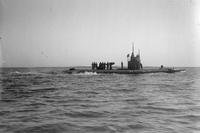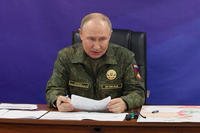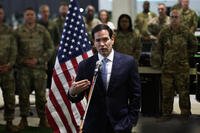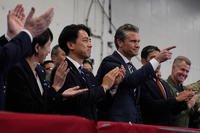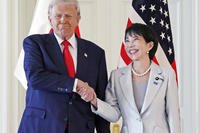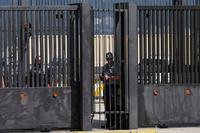Gary Anderson is a retired Marine Corps colonel who lectures on Alternative Analysis and Wargaming at George Washington University's Elliott School of International Affairs.
The opinions expressed in this op-ed are those of the author and do not necessarily reflect the views of Military.com. If you would like to submit your own commentary, please send your article to opinions@military.com for consideration.
Russia's vaunted army has been shown to be a hollow force at best and a second world show army at worst.
This began to be obvious with the failed attempt to launch a blitzkrieg to take Kyiv last winter. By spring, the Russians had abandoned the drive on Kyiv and were concentrating on artillery heavy strikes in the east.
At the time, most analysts foresaw a grinding war of attrition, despite the underperformance of Moscow's military in virtually every phase of the war. Some still hold that opinion, but the collapse of Russian forces around Kharkiv in the wake of a surprise Ukrainian offensive in that area this month should at least open the question of how Russian President Vladimir Putin might react to a complete rout of his forces.
A total disintegration of the Russian invasion force, something nearly unimaginable to most commentators mere months ago, has several potential outcomes -- ranging from peace negotiations to regional nuclear conflict. The choice will be largely up to Putin. What makes that a very dangerous situation is that the Russian president's decisions to date have not been driven by logic, at least as western minds define the term.
Thus far, Putin has been able to absorb incompetence on the part of his army and the tactical setbacks they have entailed, but his reaction to a total operational collapse is hard to predict. I was one of those people who thought he would be too smart to risk international isolation by invading Ukraine. Having been burned once, I am no longer willing to try to predict what Putin will do.
The United States has survived military debacles at the tactical and operational levels throughout its history. There have been generals such as Washington, Grant, Marshall and MacArthur and presidents such as Monroe, Lincoln and Roosevelt who picked up the pieces and saw us through adversity.
Even the old Soviet Union under Joseph Stalin's leadership was able to survive horrendous defeats and the loss of whole field armies under the weight of Adolf Hitler's surprise attack in 1941. After an initial period of mental breakdown, Stalin was eventually able to rally the nation and army. His methods were incredibly ruthless and brutal, but with the help of equally brutal subordinates such as Beria and Molotov, he was able to stem the bleeding and rally for counterattacks.
Putin may be ruthless, but he is not in the same league with Stalin. In today's world, it's hard to believe the Russian population would put up with political commissars in the ranks and having secret police behind the lines to shoot deserters and shirkers, despite what they have already been forced to endure under Putin.
If the disintegration continues, Putin will be left with three options, and none of them are good. First, he can ask a neutral third party to negotiate a truce in hopes of keeping some of Crimea, Donetsk and Luhansk. This would be a tacit admission of defeat, but it might stave off total humiliation. In recent speeches, Putin has dropped claims of eliminating Ukraine altogether and is talking only of defending ethnic Russians. This may be his method of paving the way for negotiations. However, it is unclear whether Kyiv will accept anything short of the total expulsion of Russian forces from Ukrainian soil.
Second, he could call for total mobilization, which is what Russian hard-liners want. This is a very politically dangerous move and might well give the anti-war faction something to rally around. It is also unlikely that ill-trained draftees and out-of-shape reservists will fare any better on the battlefield than the regulars who have been fighting the war to date.
The third, and worst, option is the use of tactical nuclear weapons to stem the Ukrainian tide. Russian doctrine has long accepted the use of tactical nuclear weapons as a last resort, but it has always been couched in terms of "defending the motherland." The use of such weapons to defend territory illegally gained from a sovereign nation that voluntarily gave up its own nuclear arsenal would certainly garner Russia the condemnation of the world community. Even China would likely be appalled by such an action.
Putin obviously believed when he started this conflict that the world would soon forget his aggression, as it did when he occupied the Crimean peninsula in 2014. By converting his special military operation into a nuclear war, he would almost certainly turn his country into an international pariah for years to come. A rational actor on the world stage would never have considered what Putin initiated last February, but the Russian leader has strayed so far from the rational that option three is no longer unthinkable.

